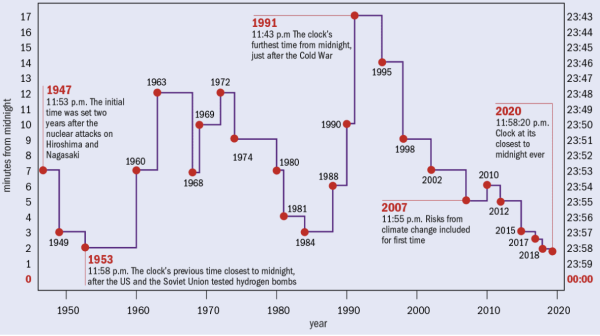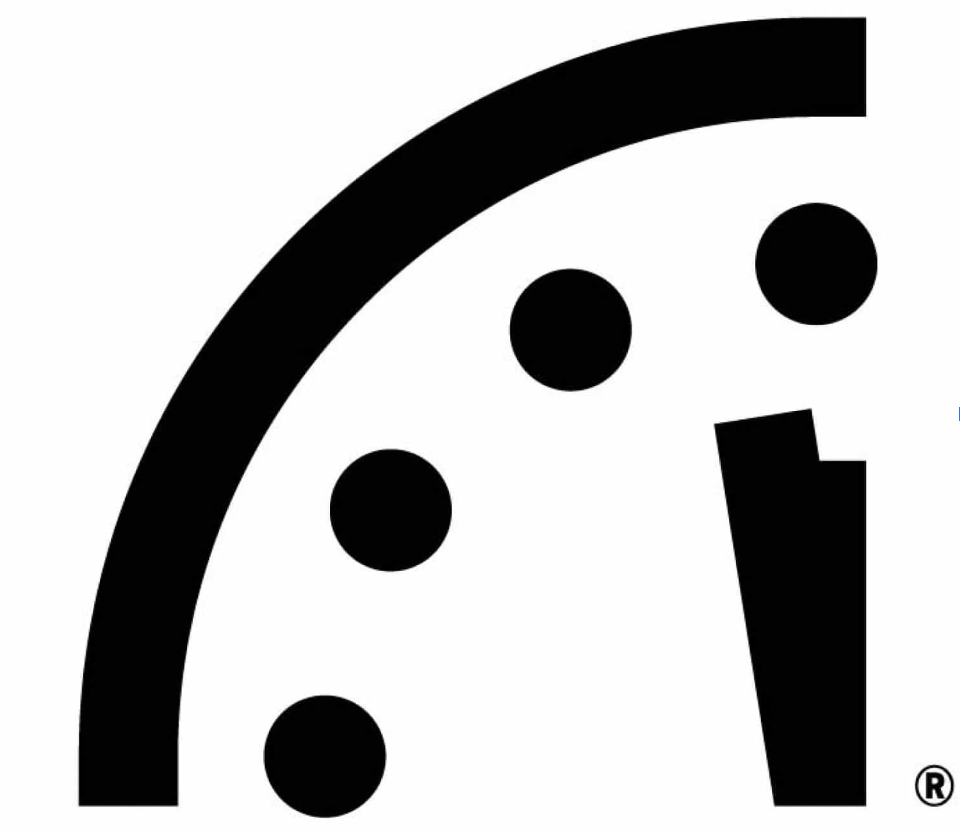Every day, time slowly slips through the hands of millions just like sand in an hourglass. But exactly how much time do we have left for humanity? This is why the Doomsday Clock was created—to show the bigger picture of how close humans are to our next disaster.
The Doomsday Clock, an ingenious metaphor warning humanity of its proximity to global catastrophe, remains perilously set at 90 seconds to midnight. This chilling symbol, maintained by the esteemed Bulletin of the Atomic Scientists, is a stark reminder of the existential threats posed by humanity’s technological prowess. According to The Bulletin, the clock’s hands, ticking ever closer to the metaphorical annihilation, underscore the dire need for collective action against the looming perils of nuclear warfare, climate change, and disruptive technologies. Its persistent positioning at a mere 90 seconds from apocalyptic midnight should sound an urgent alarm, alerting people to the idea that we are so close to causing utter destruction.

The people in the Manhattan Project at the University of Chicago first created the clock. The Manhattan Project involved the creation of the first atomic bomb, however, the group that created the clock was made to protest against the use of this destructive power on other human beings. According to news of UChicago, the Bulletin editor Eugene Rabinowitch, until he died in 1973, decided whether the clock should be changed or not by talking to political and science leaders all around the world. Today, this is decided by a group of 18 experts called the Bulletin’s Science and Security Board who all come from different backgrounds ranging from military to science history. The members meet twice a year to decide what the clock should be changed to, with the time being announced annually in late January. . During the time of the Cold War, the clock hitting midnight was meant to symbolize the launch of nuclear missiles and bombs but now it could symbolize any other human-made disaster. “The canary in the coal mine,” Professor Robert Rosner, one of the board members, said; His comparison signifies that once the canary dies, the miner is soon to follow suit.
The clock currently stands at 90 seconds till midnight, or at 11:58.30, because of the current disastrous state of the world. With three major global superpowers—the United States, China, and Russia—all spending vast amounts of money on nuclear weapons, it can be seen as a threat. However, it’s not only wars but also the idea of Earth experiencing record-setting climates like having the hottest year so far in 2023. The record-climbing greenhouse gasses and the constant temperature rising are causing the clock to tick by faster. Another factor is the dangers of Artificial Intelligence and the lack of control of it. With technological advancements increasing from just computers to now functioning Tesla robots, it is clear that without controlling these advancements, they can become a terrible weapon. Technology has already been used in military action like the use of drones and targeting missiles in wars. Letting AI spy into our daily lives without restricting them can be a larger issue in the future and the clock addresses this issue. More crimes in most first-world countries face the issue of hacking than ever before which causes concern for everyone. Luckily, it isn’t too late to turn back this clock.
The goal of working together as a group has worked well in the past and is continuing to work today. A national movement such as protesting climate change can cause countries to slowly turn to the idea of convincing others to join. The United Nations can use the effort of the people to slowly push the heavy hands away from midnight, letting humanity breathe once more. Being able to go through each threat one at a time and avoiding the worst outcome can be one of the main ways to push it back. Especially, influencing the United States, China, and Russia could help solve the overgrowing issue. While we may all have different goals and opinions in life, we share a common home on this blue planet. Learning to take care of it is the first step toward uniting people in the effort to preserve our world.








